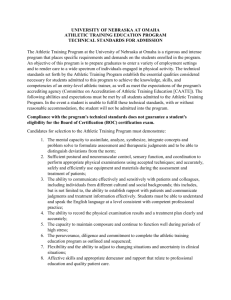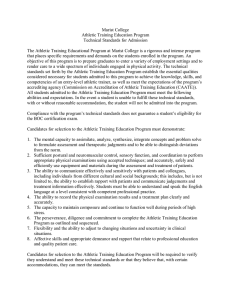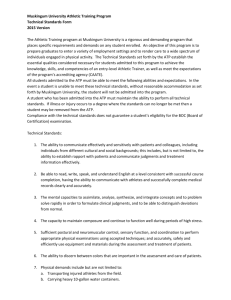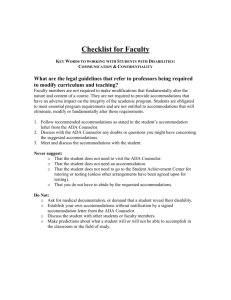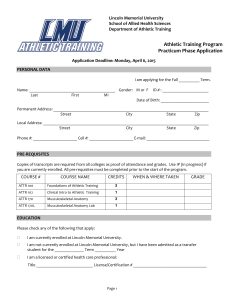REVIEW OF TECHNICAL STANDARDS
advertisement
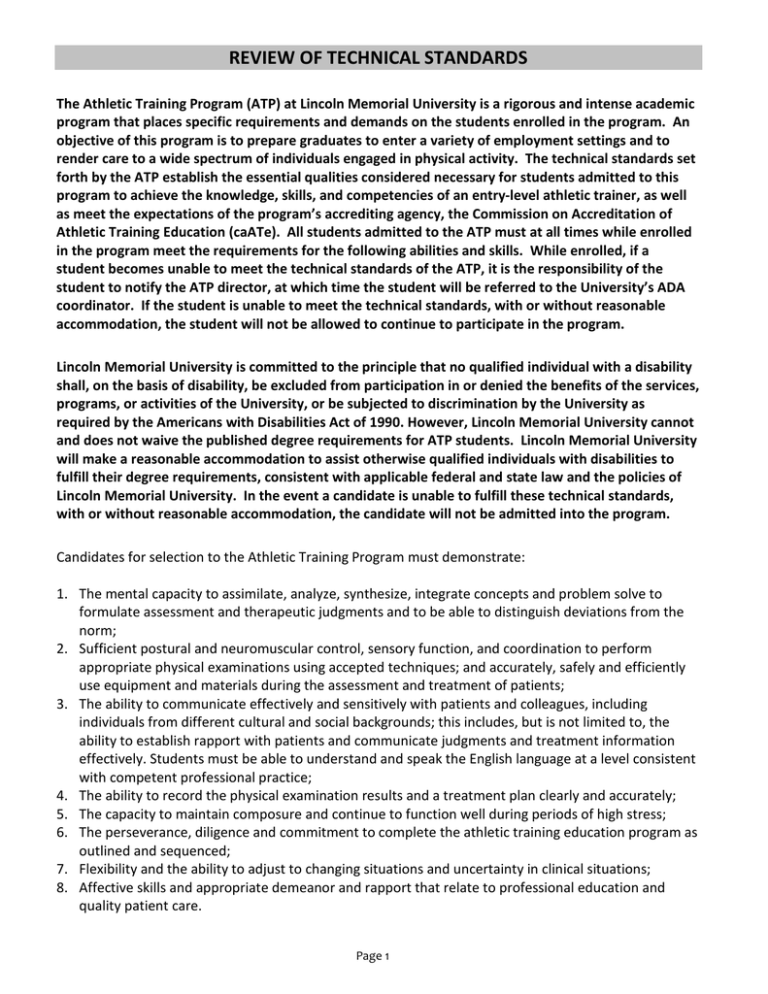
REVIEW OF TECHNICAL STANDARDS The Athletic Training Program (ATP) at Lincoln Memorial University is a rigorous and intense academic program that places specific requirements and demands on the students enrolled in the program. An objective of this program is to prepare graduates to enter a variety of employment settings and to render care to a wide spectrum of individuals engaged in physical activity. The technical standards set forth by the ATP establish the essential qualities considered necessary for students admitted to this program to achieve the knowledge, skills, and competencies of an entry-level athletic trainer, as well as meet the expectations of the program’s accrediting agency, the Commission on Accreditation of Athletic Training Education (caATe). All students admitted to the ATP must at all times while enrolled in the program meet the requirements for the following abilities and skills. While enrolled, if a student becomes unable to meet the technical standards of the ATP, it is the responsibility of the student to notify the ATP director, at which time the student will be referred to the University’s ADA coordinator. If the student is unable to meet the technical standards, with or without reasonable accommodation, the student will not be allowed to continue to participate in the program. Lincoln Memorial University is committed to the principle that no qualified individual with a disability shall, on the basis of disability, be excluded from participation in or denied the benefits of the services, programs, or activities of the University, or be subjected to discrimination by the University as required by the Americans with Disabilities Act of 1990. However, Lincoln Memorial University cannot and does not waive the published degree requirements for ATP students. Lincoln Memorial University will make a reasonable accommodation to assist otherwise qualified individuals with disabilities to fulfill their degree requirements, consistent with applicable federal and state law and the policies of Lincoln Memorial University. In the event a candidate is unable to fulfill these technical standards, with or without reasonable accommodation, the candidate will not be admitted into the program. Candidates for selection to the Athletic Training Program must demonstrate: 1. The mental capacity to assimilate, analyze, synthesize, integrate concepts and problem solve to formulate assessment and therapeutic judgments and to be able to distinguish deviations from the norm; 2. Sufficient postural and neuromuscular control, sensory function, and coordination to perform appropriate physical examinations using accepted techniques; and accurately, safely and efficiently use equipment and materials during the assessment and treatment of patients; 3. The ability to communicate effectively and sensitively with patients and colleagues, including individuals from different cultural and social backgrounds; this includes, but is not limited to, the ability to establish rapport with patients and communicate judgments and treatment information effectively. Students must be able to understand and speak the English language at a level consistent with competent professional practice; 4. The ability to record the physical examination results and a treatment plan clearly and accurately; 5. The capacity to maintain composure and continue to function well during periods of high stress; 6. The perseverance, diligence and commitment to complete the athletic training education program as outlined and sequenced; 7. Flexibility and the ability to adjust to changing situations and uncertainty in clinical situations; 8. Affective skills and appropriate demeanor and rapport that relate to professional education and quality patient care. Page 1 Mastery of these technical standards must be demonstrated by the ability to perform the following list of physical, cognitive, psychomotor, and affective skills during didactic, laboratory, and clinical education in Athletic Training. A. Visual Acuity ♦ Ability to see all colors of the spectrum ♦ Ability to distinguish calibrated markers ♦ Ability to identify digital displays and controls in differing lighted environments ♦ Ability to determine the depth of instrument placement ♦ Ability to read small print on medical instrumentation or containers B. Hearing Acuity ♦ Ability to hear alarms, beeper, and pages ♦ Ability to hear and respond to verbal communication in the work setting ♦ Ability to distinguish different alarm sounds/tones on medical devices C. Physical Acuity ♦ Ability to perform all ranges of body motions including walking, bending, stretching, reaching, and twisting of the upper and lower back. ♦ Ability to lift 35 pounds (weight of small child or small equipment) alone ♦ Ability to stand and/or sit for long periods of time ♦ Ability to perform CPR; use of hands for manually compressing resuscitation equipment, and the use of hands and body for performing chest compressions ♦ Ability to write legibly for required documentation ♦ Ability to move swiftly when the situation demands D. Communication ♦ Ability to communicate with physicians, coaches, co-workers, other health care workers, the athlete and the athlete’s family E. Mental Stress ♦ Ability to function appropriately under stress without hesitations using all knowledge and skills require to perform the task at hand ♦ Ability to work long hours (8 to 12 hours), adapting to changes in the clinical schedule and/or emergency situations ♦ Ability to function as a team member and to follow the appropriate administrative protocol and/or chain of command ♦ Ability to review and use student-athlete data in a confidential and professional manner ♦ Ability to make quick, lifesaving decisions F. Clinical Behavior Requirements ♦ Must be patient, kind, and tactful in dealing with athletes and their families ♦ Must understand that all information obtained in the clinical facilities is strictly confidential and it is not to be discussed outside the athletic training room ♦ Must attend clinical experiences as required. Page 2 Compliance with the program’s technical standards does not guarantee a student’s eligibility for the BOC certification exam. Candidates for selection to the ATP will be required to verify they understand and meet these technical standards or that they believe that, with certain accommodations, they can meet the standards. The Athletic Training Program will refer candidates for selection requesting accommodations to the University’s ADA Coordinator If a student states he/she can meet the technical standards with accommodation, then the ADA Coordinator in conjunction with the ATP Director will determine whether the student can meet the technical standards with reasonable accommodation. Reasonable accommodations must take into account whether accommodation would jeopardize clinician/patient safety, or the educational process of the student or the institution, including all coursework, clinical experiences and internships/externships deemed essential to graduation. PLEASE SIGN ONLY THE APPROPRIATE SPACE BELOW REGARDING THESE TECHNICAL STANDARDS Statement for students NOT requesting accommodations I certify that I have read and understand the technical standards for selection listed above, and I believe to the best of my knowledge that I meet each of these standards without accommodation. I understand that if I am unable to meet these standards I will not be admitted into the program. Applicant Signature: ______________________________________ Date: ____________________________ Alternative statement for student requesting accommodations I certify that I have read and understand the technical standards of selection listed above and I believe to the best of my knowledge that I can meet each of these standards with certain accommodations. I will contact the ADA Coordinator to determine what accommodations may be available. I understand that if I am unable to meet these standards with or without accommodations, I will not be admitted into the program. Applicant Signature: ______________________________________ Date: ____________________________ Page 3

